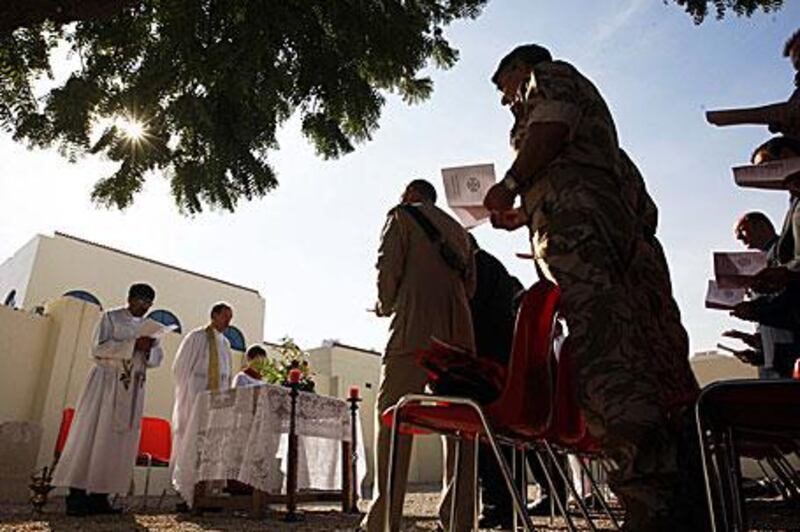SHARJAH // The abandoned cemetery, strewn with rubble, broken chairs and even an old mattress, moved Frank Wright to tears when he visited 14 months ago to lay a wreath for an airman he served with in the 1960s. Mr Wright, 75, a former officer with the Royal Air Force, had booked on to the QE2's final voyage to Dubai with his wife and decided to visit the grave of one of his colleagues, who had died in a traffic accident when serving at the RAF base in Sharjah in 1969.
"On entering the cemetery it looked to me like nothing more than a tip," he said. "It looked like a builder's yard that had been neglected." Twelve British servicemen are buried in the small plot, walled off from the rest of the graveyard. Most of them died in traffic accidents or from illness while posted in the emirates in the 1960s and early 1970s. The cemetery, once part of the RAF Sharjah base, tis now within the grounds of St Martin's church. Yesterday, through the efforts of Mr Wright and others, it was unveiled as a more fitting resting place for the men who served their country, after it had been neglected for decades.
"We were in tears actually, we were so distressed to think that servicemen could be left in such conditions," said Mr Wright, who is from Durham, in the north of England. "Those graves hadn't been touched for over 30 years and as far as I'm concerned that's a total scandal." In the servicemen's cemetery, headstones were worn smooth by wind and sand. Bushes and scrub had grown over the graves. Litter and rubble were everywhere. In the main graveyard, the wooden crosses that once marked the non-military graves were gone, and in their place breeze blocks painted white were the only sign that a body was interred there.
After a year-long campaign, including letters to the British armed forces minister, the Commonwealth War Graves Commission (CWGC) and members of parliament, Mr Wright's plea was finally heard. "Those buried here were properly honoured, but over the years the graveyard fell into a state of disrepair," said Edward Oakden, the British ambassador. "As soon as people realised that the graves were here it was quite clear that something needed to be done. The only question was who was responsible for doing it."
The graves commission is famous for keeping its cemeteries across the world immaculately groomed. The graves have been under the responsibility of the CWGC since 2005, and were originally maintained under a local contract "but this arrangement proved unsatisfactory," the commission said. The cleanup, including providing the new headstones, was done by the CWGC but funded by the Service Personnel and Veteran's Agency, which is part of the Ministry of Defence.
At yesterday's ceremony, military and embassy officials and a detachment of air force men gathered for a service to honour the dead. A bugler played the Last Post and two minutes of silence were held before crosses were placed on each grave. The graveyard, which in Mr Wright's day was surrounded by open desert, is now deep in urban Sharjah and the sound of schoolchildren at play travelled over the cemetery walls.
"I found it a very moving ceremony," Mr Oakden said. "I think it's nice that the people that died are lying here, surrounded by the laughter of children." There are now uniform white headstones and the cemetery is clear of litter, but work remains to be done. Rubble still covers the main churchyard. Peter Francis, a spokesman for the Commonwealth War Graves Commission, said the graves would be kept in order.
"The 12 graves will be visited on a regular basis as part of our normal inspection cycles and we are pleased and honoured that we have helped secure their future and enabled the graves to reach a standard befitting the sacrifice of these men," he said. A 13th grave, that of Captain HW Brammall, a decorated officer in the Royal Navy, was also honoured in yesterday's ceremony. The captain is buried outside the serviceman's area as he died while in the merchant navy, but Mr Wright, who was invited to the ceremony but was unable to attend, said he believes Capt Brammall should be reinterred inside, and embassy staff agree. "That's the next step," said Col Rupert Robson, the embassy's defence attaché. "We want to see him reinterred there."We'll also be making sure officers go up there on a regular basis to ensure all the graves are maintained. These men deserve a fitting resting place."
lmorris@thenational.ae






